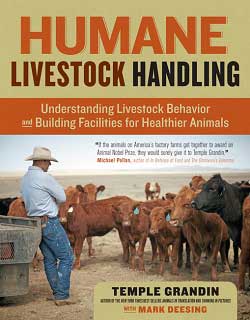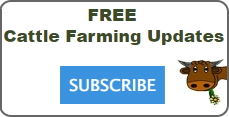Humane Livestock Handling: Understanding livestock behavior and building facilities for healthier animals
Author: Dr. Temple Grandin
Category: Livestock Handling, Cattle Psychology
Why I recommend this book
In Humane Livestock Handling, Dr. Temple Grandin does a fantastic job explaining cattle psychology, how our behavior affects them and how to modify our behavior around cattle. It then provides clean, clear, easy-to-follow plans for handling facilities that are designed to work with how cattle think and perceive the world around them.
It is an enjoyable read and an essential resource for anyone raising beef cattle!
Availability

(Disclosure: I get commissions for purchases made using Amazon links in my post.)
Use the links below to explore Humane Livestock Handling on Amazon:
- Amazon.com#CommissionEarned
- Amazon.ca#CommissionEarned
- Amazon.co.uk#CommissionEarned
From the Publisher: Dr. Temple Grandin, North America's most influential advocate of humane livestock treatment, has spent her life developing stress-free facility designs and standards of humane management. In an environment of growing concern regarding large factory-farming practices, Grandin is a voice of reason explaining the benefits of keeping animals calm through every phase of their lives — benefits that include safer working conditions, higher yields of marketable meat, better-quality meat, and, of course, more humane conditions for the animals.
The first half of Humane Livestock Handling reviews the natural behavior and temperament of cattle. Working with the animals' natural instincts, Grandin describes low-stress methods for moving cattle on pastures, paddocks, and feedlot pens. Slow, controlled movement reduces stress and fear, resulting in calmer, healthier cattle. They eat better, are less likely to become sick, and do not run into fences and gates, injuring themselves and bruising the meat. Calm cattle are also far less likely to injure the humans working with them.
The second half of the book is packed with construction plans, diagrams and detailed designs for putting Grandin's ideas into practice. Featuring plans for everything from gate latches to chutes, corrals, and sorting pens for full-scale facilities, there are designs that can be used in both large and small operations. In fact, half of the cattle in North America are already handled in systems designed by Grandin, and the demand for humanely processed meat continues to grow.
Temple Grandin's systems are quickly becoming the industry-wide standard. No livestock operation, small or large, can afford to ignore Humane Livestock Handling.
Reader Reviews:
Have you read Human Livestock Handling? Share your review in the Comments section below!
And if you'd like to recommend another book about cattle ranching that's not listed among my recommended books, tell me about it via my contact form.

